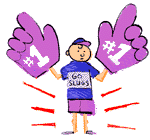Living Vicariously Through Sports Teams: Is It Healthy?
Avid sports fans shiver through snowstorms and broil under the hot sun to cheer on their teams. Such dedication is great for the athletes, but how does it affect the people in the stands?
“When individuals identify and form a strong connection with a local team, it is related to psychological health,” says Daniel L. Wann, PhD, associate professor of psychology atMurrayStateUniversityinKentuckyand co-author of a book about sport-fan psychology. “The more they identify with the team, the higher their self-esteem, the higher their vigor or energy, the lower their fatigue, confusion, depression, and alienation.”
For Better or Worse
“Chicago Cubs fans go to Wrigley Field to have a good time, feel that camaraderie, and sense of belonging. Whatever the Cubs do is a side issue,” says Dr. Wann. “The beauty of it is that it doesn’t matter how good the team is, you get the effects anyway.”
Togetherness
 Edward Hirt, PhD, associate professor of psychology atIndianaUniversity, feels that sports provide many avenues for meeting the human need to belong. “People can go to games together, watch broadcasts together, talk and commiserate on the radio or through email or play fantasy sports together,” he explains. And social networking sites, like Facebook and Twitter, give sports fans yet another opportunity to connect over the triumphs and defeats of their favorite team.
Edward Hirt, PhD, associate professor of psychology atIndianaUniversity, feels that sports provide many avenues for meeting the human need to belong. “People can go to games together, watch broadcasts together, talk and commiserate on the radio or through email or play fantasy sports together,” he explains. And social networking sites, like Facebook and Twitter, give sports fans yet another opportunity to connect over the triumphs and defeats of their favorite team.
Team Allegiance
Dr. Hirt studied fans of Big Ten basketball and found that those with an allegiance to a particular team felt better about their own abilities and sex appeal when their team won. After a loss, fans were far more pessimistic about their chances of making a free throw, completing word games, and getting a date. “When the team does well, fans treat it like they themselves did well,” says Dr. Hirt.
Wins and Losses
Post-game moods tend to be quite predictable. During the euphoria of a win, fans share in the glory, give high-fives to each other, and when referring to the game say, “We won.” When not victorious, fans deflect the blame, saying, “They lost.”
But the sense of bonding remains as fans commiserate and share memories of big plays with fellow fans they meet in the parking lot or at the deli counter. Those who feel a strong connection with the team tend to feel angry, upset, or depressed. “For a day or two, you feel down in the dumps,” says Dr. Wann. “But, within a short time, the vast majority bounce back.”
Vigor and Violence
Dedicated supporters are proud of their allegiance, but sometimes team spirit can be carried too far. “If you’re all gung-ho for your team and anything goes in terms of people who are your rivals, that’s when violence can happen,” explains Dr. Hirt.
The vast majority of fans take games in stride, but for a small number, spectating may not be a healthy pastime. Dr. Hirt suspects some team worshippers could benefit from gaining the perspective that it’s only a game. Sports can become disruptive to interpersonal relationships and, for some fans, an excuse to act violently. For example, riots by fans after a team wins have plagued someUScities, as well as European soccer venues.
All About Bonding
What makes someone forge an allegiance to a group of people they have never met? Most often geographic location plays a role in the attachment, as does a family history of rooting for a specific team. Alumni frequently stay committed to their college team. Winning, while a factor, is not as important as some would think. Bonding is the main attraction.
REFERENCES:
Dabbs JM, Dabbs MG. Heroes, Rogues, and Lovers: Testosterone and Behavior.New York: McGraw-Hill; 2000.
GeorgiaStateUniversitywebsite.
UF study backs suspicions: for some, sports really is better than sex.UniversityofFloridawebsite.
Wann D, et al. Sport Fans: The Psychology and Social Impact of Spectators.New York: Routledge; 2000.





